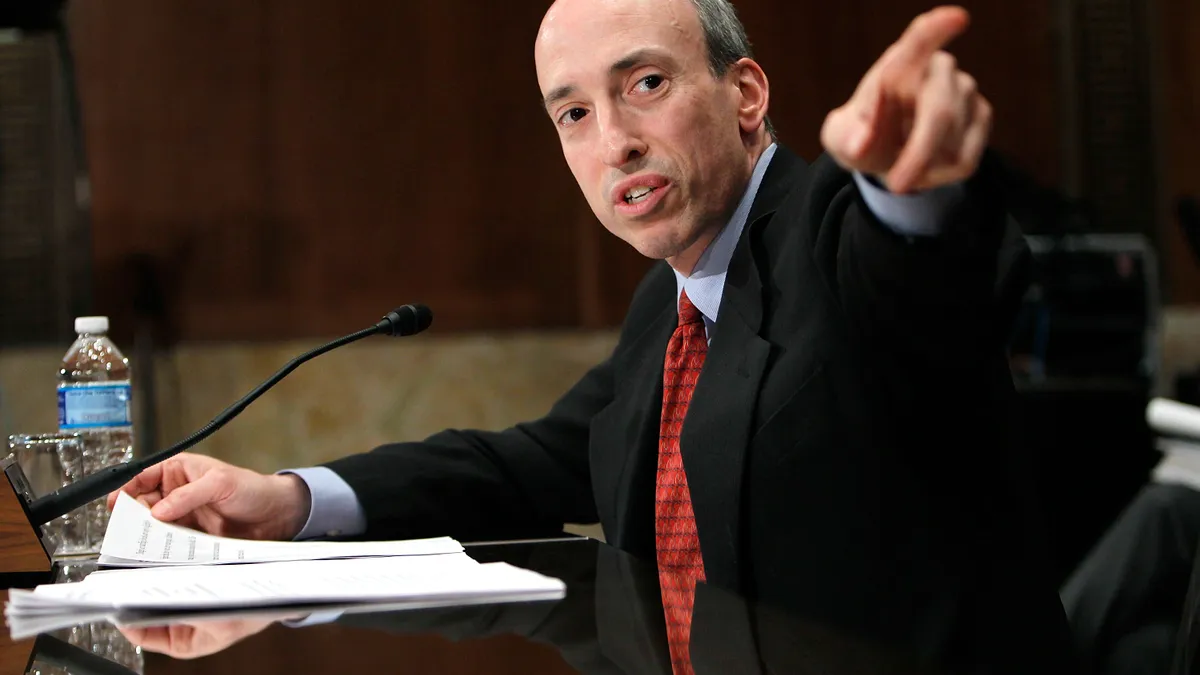Dive Brief:
- Securities and Exchange Commission Chair Gary Gensler said today that the Bloomberg Short Term Bank Yield Index (BSBY) is vulnerable to manipulation and unsuitable as a replacement for the London Interbank Offered Rate (LIBOR), the reference rate for trillions of dollars in mortgages, derivatives, business loans and other financial contracts worldwide.
-
Both BSBY and LIBOR are based on comparatively low trading volumes, Gensler said in remarks prepared for City Week 2021. With BSBY, “like with LIBOR, we’re seeing a modest market, shouldering the weight of hundreds of trillions of dollars in transactions,” he said, adding “when a benchmark is mismatched like that, there’s a heck of an economic incentive to manipulate it.”
- While a Bloomberg LP spokesperson declined to comment on Gensler’s remarks, the company said in a 2020 description of BSBY that the reference rate “has proven robust to a range of historical back-tests and hypothetical scenario analysis, including potential data manipulation from market participants.”
Dive Insight:
The SEC, Federal Reserve and other regulators in recent weeks have stepped up pressure on financial institutions and other companies to shift to alternative reference rates from LIBOR, which is due for a phase out at the end of this year following a manipulation scandal in 2012.
Financial regulators have called for adoption of the Secured Overnight Financing Rate (SOFR), warning that BSBY and other alternative reference rates favored by many commercial banks are underpinned by low trading volumes and may pose a risk to financial stability.
BSBY “has many of the same flaws as LIBOR,” Gensler said, adding “they both rely on a relatively thin market that tends to disappear in times of stress.”
SOFR, while based on high transaction volumes, has not eclipsed LIBOR as a reference rate because it currently lacks some of LIBOR’s appealing traits. LIBOR is derived from London banks' estimates of what they would be charged when borrowing from other banks. The LIBOR rate can be forecast three, six and 12 months into the future.
SOFR is based on overnight repurchase agreements secured by Treasuries and, unlike LIBOR, does not reflect credit risk or expedite the creation of a term structure enabling corporate treasurers and financial institutions to make forward-looking rate calculations.
Bloomberg promotes BSBY as a “supplement” to SOFR. The reference rate is based on quotes and transaction data from banks trading in commercial paper, certificates of deposits and other assets.
“Since BSBY is based on transactions of instruments used by banks to fund themselves, it includes a systemic credit spread in its rate and can be used as a supplement to SOFR in the lending market,” according to Bloomberg.
Treasury Secretary Janet Yellen has also endorsed SOFR and warned against the use of credit sensitive rates (CSRs) such as BSBY.
“The decisions made now around the selection of alternative rates will determine whether some of LIBOR’s shortcomings may be replicated through the use of alternative rates that lack sufficient underlying transaction volumes,” Yellen said on June 11, adding some benchmark rates other than SOFR may, like LIBOR, become “vulnerable to manipulation and disruption.”
The comments by U.S. financial regulators mark a clear shift, according to PwC.
"We have previously seen regulators avoid declaring winners and losers,” PwC said. “The government health warning attached to CSRs is increasingly clear: borrowers (and lenders) transacting in these rates do so at a risk that is not to be underestimated.”















